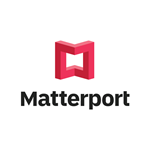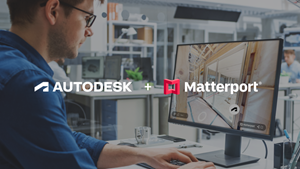A photo accompanying this announcement is available at https://www.globenewswire.com/NewsRoom/AttachmentNg/0426b629-ec0e-4707-aae3-4b4d66965843
SUNNYVALE, Calif., March 14, 2023 (GLOBE NEWSWIRE) -- Matterport, Inc. (Nasdaq: MTTR), today announced a new integration with Autodesk Construction Cloud– a portfolio of software and services that combines advanced technology, a builders network and predictive insights for construction teams –making it easier for project teams using Matterport and Autodesk Build ® to collaborate within critical project management workflows. This new integration allows project stakeholders to enhance the “Request for Information” (RFI) process in Autodesk Build, moving from traditional methods of communication to immersive digital twin technology, powered by Matterport.
Construction projects involve hundreds of stakeholders, many of whom rely on documents and images to coordinate the construction lifecycle from design to to operations. While project management tools can ease the burden of organizing various materials, the current process of relying on complex 2D and 3D files often results in project inaccuracies or misunderstandings between stakeholders, leading to rework or costly delays.
To address information gaps on a project, construction professionals submit an RFI. The typical RFI process involves queries by construction and design teams. Teams label issues directly onto the documents or images, with each project stakeholder responsible for updating the documentation with new information to clarify incomplete data or references.
This process can be tedious and time-consuming, as documentation typically spans multiple formats that constantly evolve as stakeholders weigh in, making it difficult for teams to track the latest information. According to a Navigant Construction Forum survey, the average construction project will result in more than 800 RFIs, averaging more than 50 RFI’s submitted per week. Each request consumes an average of eight hours of administrative labor to receive, log, review and respond to the RFI1. Inaccurate or incomplete documentation is responsible for an estimated 48% of the rework that occurs in the construction industry in the United States, according to the research paper, Construction Disconnected, conducted by Thomas et al., 20182.
Matterport’s new integration with Autodesk Build improves and streamlines this documentation process by creating a visual system-of-record for site conditions, allowing users to create and track requests directly within the digital replica of the space. Matterport users can now place an Autodesk Build RFI pin at the exact place of concern within the photorealistic digital twin, allowing any stakeholder on the project to view the issue in the same spatial context it exists in the physical world, expediting issue resolutions to improve understanding and reduce delays.
“Professionals in architecture, engineering and construction want the ability to manage their entire project portfolio from anywhere they are, without having to sacrifice quality or time to build,” said Jay Remley, Chief Revenue Officer, Matterport. “This integration builds on the digital transformation Autodesk has been leading in the construction industry for decades, leveraging Matterport’s digital twins to create a visual source of truth relative to the work to be done onsite in Autodesk Construction Cloud. Now, all project stakeholders can experience a more efficient RFI process from anywhere with the same precision as if they were in person, streamlining communication to maximize project visibility and cut out unnecessary delays.”
“Delays or disruptions in the RFI process can have significant ripple effects on construction schedules and budgets,” said James Cook, director of integration partnerships, Autodesk Construction Solutions. “Linking Autodesk Build’s collaborative RFI workflows with Matterport’s 3D scans can help stakeholders improve the velocity and quality of their RFI answers. With this integration, project stakeholders are provided additional flexibility and transparency in the RFI process with a visual representation using digital twin technology.”
This marks an important evolution of the partnership between Matterport and Autodesk to make collaboration solutions more efficient for architects, engineers, and construction professionals. It builds on previous add-ons and integrations such as Matterport Plug-in for Revit, which enables customers to import Matterport add-ons directly into Autodesk Revit, and Matterport BIM Files, allowing Autodesk users to transform Matterport spaces into BIM (.rvt) and CAD (.dwg) files.
Matterport is available today in the Autodesk App Store for all supported regions, with future updates planned to include even deeper support and functionality for Autodesk Construction Cloud within Matterport’s digital twins. To learn more, visit the Matterport Blog.
About Matterport
Matterport, Inc. (Nasdaq: MTTR) is leading the digital transformation of the built world. Our groundbreaking spatial data platform turns buildings into data to make nearly every space more valuable and accessible. Millions of buildings in more than 177 countries have been transformed into immersive Matterport digital twins to improve every part of the building lifecycle from planning, construction, and operations to documentation, appraisal and marketing. Learn more at matterport.com and browse a gallery of digital twins.
©2023 Matterport, Inc. All rights reserved. Matterport is a registered trademark and the Matterport logo is a trademark of Matterport, Inc. All other marks are the property of their respective owners.
Media Contact:
Charlie Stager
Director, Communications
press@matterport.com
Investor Contact:
Mike Knapp
VP, Investor Relations
ir@matterport.com
Forward-Looking Statements
This document contains certain forward-looking statements within the meaning of the federal securities laws, including statements regarding the benefits of the business combination, the services offered by Matterport, Inc.
(“Matterport”) and the markets in which Matterport operates, business strategies, debt levels, industry environment, potential growth opportunities, the effects of regulations and Matterport’s projected future results. These forward- looking statements generally are identified by the words “believe,” “project,” “expect,” “anticipate,” “estimate,” “intend,” “strategy,” “future,” “forecast,” “opportunity,” “plan,” “may,” “should,” “will,” “would,” “will be,” “will continue,” “will likely result,” and similar expressions (including the negative versions of such words or expressions).
Forward-looking statements are predictions, projections and other statements about future events that are based on current expectations and assumptions and, as a result, are subject to risks and uncertainties. Many factors could cause actual future events to differ materially from the forward-looking statements in this document, including the expected benefits of Matterport’s integration with Autodesk Construction Cloud, Matterport’s ability to provide deeper support and functionality for Autodesk Construction Cloud, Matterport’s ability to implement business plans, forecasts, and other expectations in the industry in which Matterport competes, and identify and realize additional opportunities. The foregoing list of factors is not exhaustive. You should carefully consider the foregoing factors and the other risks and uncertainties described in documents filed by Matterport from time to time with the U.S. Securities and Exchange Commission (the “SEC”). These filings identify and address other important risks and uncertainties that could cause actual events and results to differ materially from those contained in the forward looking statements. Forward-looking statements speak only as of the date they are made. Readers are cautioned not to put undue reliance on forward-looking statements, and Matterport assumes no obligation and, except as required by law, does not intend to update or revise these forward-looking statements, whether as a result of new information, future events, or otherwise. Matterport does not give any assurance that it will achieve its expectations.
1
Impact & Control Of RFIs On Construction Projects
2 Construction Disconnected. Mill Valley, CA: PlanGrid and FMI, 41.











